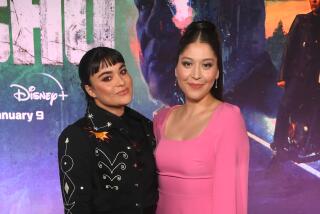Reading Tolkien
- Share via
Let us once and for all dispel the insidious notion propagated by J.R.R. Tolkien’s critics that he was somehow a racist (“A Sometimes-Shifting Line Between Fantasy, Reality,” Jan.12). Reed Johnson crudely equates Tolkien’s “aesthetic love” of Nordic literature with Nazism. That makes about as much sense as claiming anyone who loves African music must be a supporter of dictator Robert Mugabe. Especially since, as Johnson himself acknowledges, Tolkien frequently and explicitly denounced Hitler’s Third Reich and its “wholly pernicious and unscientific race-doctrine” (Tolkien’s words).
As for the ridiculous interpretation that orcs are supposed to be stand-ins for blacks, I fear that it says more about those who see black people where there are Orcs than it does about Tolkien’s own views. These same critics overlook the obvious theme in his work about learning to appreciate racial and cultural differences, as beautifully illustrated by the evolving relationship between dwarf Gimli and elf Legolas -- decades before multiculturalism became all the rage.
Johnson generously gives Tolkien, who was born in South Africa, a pass for his alleged racism, arguing that “he was, like most of us, a creature of his times.” And yet in his valedictory Oxford address, Tolkien boldly proclaimed, “I have the hatred of apartheid in my bones.” This was in 1959, well before such a view became fashionable. Creature of his times? A man for all seasons, more likely.
Alistair Latour
Santa Monica
More to Read
Sign up for our Book Club newsletter
Get the latest news, events and more from the Los Angeles Times Book Club, and help us get L.A. reading and talking.
You may occasionally receive promotional content from the Los Angeles Times.










